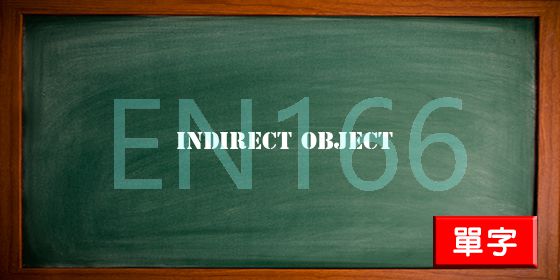indirect object 【語法】間接受詞。
【語法】間接受詞。 “indirect“ 中文翻譯: adj. 1.間接的,第二手的;迂回的;曲折的。 2.不 ...“object“ 中文翻譯: n. 1. 物,物體,物件。 2.目標 (of; for ...“indirect object pronouns“ 中文翻譯: 間接賓格代詞“indirect“ 中文翻譯: adj. 1.間接的,第二手的;迂回的;曲折的。 2.不直截了當的,不坦率的,不誠實的。 an indirect answer 側面回答。 indirect descent 旁系。 indirect fire 【軍事】間接射擊。 an indirect route 迂回的路,繞行的路。 make an indirect reference to sb. 間接提到某人。 indirect methods 不正當的手段。 adv. -ly ,-ness n. “object“ 中文翻譯: n. 1. 物,物體,物件。 2.目標 (of; for); 目的,宗旨。 3.【哲學】對象,客體,客觀 (opp. subject); 【語法】賓語。 4.〔口語〕(可笑或可憐的)人[物]。 a small [strange] object 小[奇怪]東西。 the object of study 研究的對象。 the direct [indirect] object 直接[間接]受詞。 What an object you have made (of) yourself! 〔口語〕你這家伙把自己搞得真不像樣子! attain [achieve, gain, secure] one's object 達到目的。 fail [succeed] in one's object 沒有達到[達到]目的。 for that object 為了那個目的。 no object 〔廣告用語〕怎樣都好,不成問題;沒有困難(Distance is no object. (待聘者)上班距離(遠、近)不成問題)。 propose an objectto oneself = set an object before one 立志,立下目標。 with that object in view 懷著那個目的。 vi. 1.反對,抗議,表示異議 (against, to)。 2.抱反感,不服氣,有意見。 vt. 提出…作反對的理由 (that)。 If you don't object. 假使你不反對。 I object. 〔英下院〕我反對。 I object against him that he is a hypocrite. 我反對他,因為他是個偽君子。 object to 1. 反對(I object to your doing that. 我反對你做那件事)。 2.討厭(I object very much to a wet weather. 我非常討厭潮濕的天氣)。 adj. -less 沒有目的[宗旨]的,沒有物像的。 “object to“ 中文翻譯: 反對,不贊成; 反對;抗議,抱反感; 反對;抗議;不支持; 聲稱; 提出異議; 贊成……的人則認為“to object to“ 中文翻譯: 提出異議“object(object)“ 中文翻譯: 物件功能“indirect bill; indirect paper“ 中文翻譯: 間接匯票“indirect intent; indirect iintentino“ 中文翻譯: 間接故意“address, indirect“ 中文翻譯: 間接地址“addressing indirect“ 中文翻譯: 間接定址法; 間接尋址法“control, indirect“ 中文翻譯: 間接控制“file indirect“ 中文翻譯: 文件間接寄存器“indirect action“ 中文翻譯: 間接酌; 又稱間接作用“indirect activation“ 中文翻譯: 間接活化“indirect activities“ 中文翻譯: 輔助業務“indirect addre“ 中文翻譯: 間接地址“indirect address“ 中文翻譯: 間接地址“indirect addressing“ 中文翻譯: 間接編址; 間接定址; 間接尋址“indirect aerology“ 中文翻譯: 間接高空學“indirect agency“ 中文翻譯: 間接代理“indirect agglutination“ 中文翻譯: 間接凝集反應“indirect aggression“ 中文翻譯: 間接攻擊“indirect aiming“ 中文翻譯: 間接瞄準
indirect passive |
|
Common function words in japanese include “ case markers , “ or short sounds which can indicate whether a noun is a subject , direct object , indirect object , etc 在日語里最常見的冠詞包括“句子標識,弱音指示名詞的格式,如主語,直接賓語,間接賓語”等虛詞。 |
|
Some verbs take two objects , one of which is generally an indirect object ( persons ) , and the other of which is a direct object ( objects ) 漢語中有的動詞后邊可帶兩個賓語。一般一個指人,靠近動詞,稱間接賓語;一個指事物,稱直接賓語。 |
|
Some verbs take two objects , one of which isgenerally an indirect object ( persons ) and the other of which is a direct object . ( objects ) 漢語中有的動詞后邊可帶有兩個賓語。一個指人(間接賓語) ,一個指物(直接賓語) 。 |
|
The entire c notion of a pointer as a toggle between a machine address and an indirect object reference doesn t exist 指針作為計算機地址和間接對象引用之間的切換,這樣的c + +概念全然不存在。 |
|
It also performs bounds checking and eliminates indirect object access , even under error conditions 也執行數組維度檢查和消除間接對象訪問,甚至在錯誤的條件下。 |
|
It can also follow a plural subject or an indirect object with a plural verb 這個詞還可以用于復數的主語之后或復數動詞的間接賓語之后。 |
|
It can also follow a plural subject or an indirect object with a plural verb 這個詞還可以用於復數的主語之或復數動詞的間接賓語之。 |
|
You should put the direct object after the indirect object 你應該把直接賓語放在間接賓語之后。 |
|
The direct object of “ tell “ is usually the information given and the indirect object is the person that it is given to . “告訴”的直接賓語通常是提供的信息,間接賓語是接受信息的人。 |

